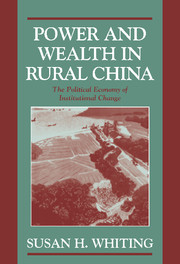Book contents
- Frontmatter
- Contents
- List of Maps, Figures, and Tables
- Preface
- 1 Explaining Institutional Change
- 2 The Maoist Legacy in Rural Industry
- 3 Incentive Structures and Local Cadre Behavior
- 4 Incentives, Constraints, and the Evolution of Property Rights
- 5 Stasis and Change in Extractive Institutions
- 6 Credit Allocation and Collective Organizational Structures
- 7 The Political Economy of Institutional Change
- Appendix
- Bibliography
- Index
7 - The Political Economy of Institutional Change
Published online by Cambridge University Press: 30 September 2009
- Frontmatter
- Contents
- List of Maps, Figures, and Tables
- Preface
- 1 Explaining Institutional Change
- 2 The Maoist Legacy in Rural Industry
- 3 Incentive Structures and Local Cadre Behavior
- 4 Incentives, Constraints, and the Evolution of Property Rights
- 5 Stasis and Change in Extractive Institutions
- 6 Credit Allocation and Collective Organizational Structures
- 7 The Political Economy of Institutional Change
- Appendix
- Bibliography
- Index
Summary
THIS study has analyzed how the actions of local state officials shaped institutions of property rights in rural industry and how the structure of property rights, in turn, influenced the extractive institutions and allocative practices of the state in each of three locales. This local story is set in the context of a larger constellation of national-level institutions and policies. The policies and actions of the central state, refracted through the prism of intervening levels of administrative hierarchy, created incentives and constraints that shaped the behavior of local state officials. In this way, national institutions have been taken as exogenous to the dynamics examined in the study thus far. This stance was appropriate both because the study has focused on incentives and constraints at the local level and because national institutions were relatively unchanging in their fundamentals over the period covered by the core of the study.
This concluding chapter broadens the scope of the analysis by examining interactions between the dynamics of the system at the local level and at the central level. Specifically, the actions of local officials have created pressure for change at the central level. Indeed, since 1994, fundamental changes have occurred in the national institutional environment. This chapter addresses the occurrence of major changes in central state institutions and analyzes their effects on the evolution of property rights at the local level.
- Type
- Chapter
- Information
- Power and Wealth in Rural ChinaThe Political Economy of Institutional Change, pp. 265 - 299Publisher: Cambridge University PressPrint publication year: 2000
- 1
- Cited by



